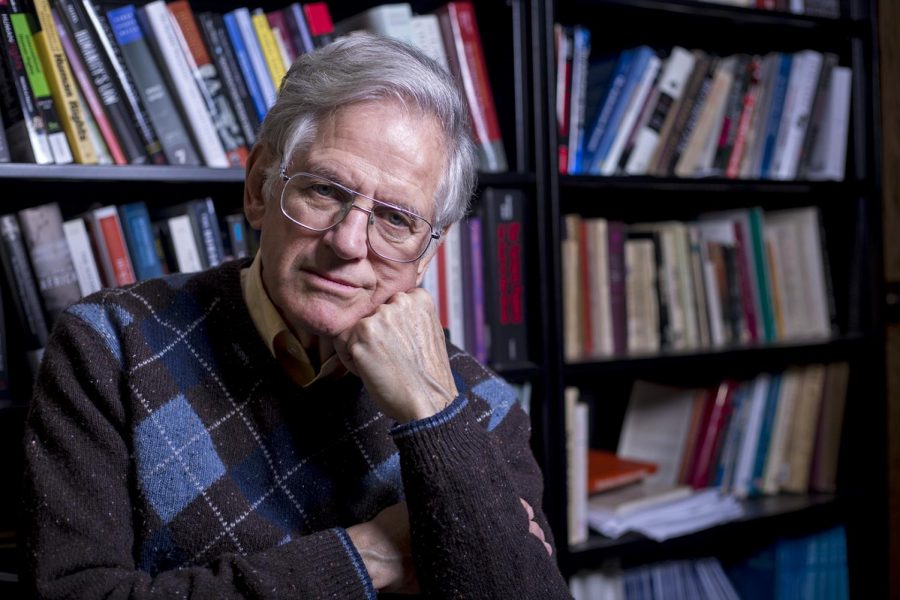Former professor hones on human rights
April 4, 2017
Sam McFarland, the Professor Emeritus at the Department of Psychology at WKU, is now working on American Psychological Association’s Task Force on Human Rights, but his passion for human rights can be traced back decades.
McFarland found his calling in human rights after reading “The Rise and Fall of the Third Reich” by William Shirer.
“For some reason that really resonated with me, and I’ve had a lingering concern for human rights since that time,” McFarland said.
McFarland attended Lipscomb University for his undergraduate degree in Bible and Mathematics, following with Divinity School at Vanderbilt where he later earned his graduate degree in psychology. McFarland came into school wanting to be a minister but soon realized that wasn’t his calling.
“By the time I got through that [Divinity School], I didn’t fit at the pulpit, I knew I didn’t want to be in the position of upholding; my own thinking had migrated enough and I didn’t want to be in the position of upholding anyone’s theology,” McFarland said. “So psychology seemed a natural way to go after that.”
McFarland worked with street-level activism in his past, with one of his favorite memories being holding up flags for peace around the Pentagon. In 1971, McFarland came to WKU to be an assistant professor, where he was faculty adviser for various organizations focused on human rights, such as Amnesty International.
McFarland saw a void in the education of human rights and took it upon himself to develop a course that would better educate undergrad students on the subject.
“I developed a course called ‘Understanding Human Rights’ for the honor’s courses and Honor’s College, just kind of an awareness of, part of it, in truthful self- education,” McFarland said.
McFarland saw this void in the lack of education and knowledge that undergrad students showed in human rights.
“Even our really, really bright, undergraduate students don’t know any of it, they don’t know what the Universal Declaration of Human Rights is, they’ve never read it or heard of it,” said McFarland. “I wanted to develop that course simply because I saw it as such a void, that students really did not have a grip of understanding. They may be activists in a certain area but in terms of having a broad view, very, very few students had that. I only gained it by filling my library with books on human rights, reading tons, and saying ‘okay, let’s organize this into a course.’”
While teaching the class, McFarland wanted the students to look beyond themselves and into other marginalized groups in order to get a broader awareness.
“I wanted to be sure [the course] focused them on a broader world, and did not have a kind of self-focus,” McFarland said. “So that was my general philosophy of teaching that course, and teaching in general frankly. And that was just a manifestation of the kind of philosophy I had.”
Now, McFarland is focused on writing about these issues, publishing an accessible overview of human rights that he updates every 18 months on the American Association for the Advancement of Science’s Science and Human Rights Coalition titled “Human Rights 101: A Brief College-Level Overview.”
“When I finished teaching in 2013, I said ‘what is needed is an easy to read download that anyone can download for a one or two day reading over human rights, that gives an overview,” McFarland said.
The idea behind the document is to allow free, easy access to more updated information regarding human rights.
“There are positives and negatives, but those kind of need to be updated periodically,” McFarland said. “The idea is that anybody can download this and use it but let’s keep it in one basic place where everybody links to the latest, updated version.”
McFarland believes students at WKU can have an impact on the world if they have a broader understanding of the big picture.
“I’m more interested in how students at WKU can affect human rights,” McFarland said. “WKU students, if you look at the world, are a very privileged group of people, and I want them to understand that. In comparison to the rest of the world, I want them to understand the plight of the Syrian refugees.”
Today, much of McFarland’s activism is focused in supporting organizations dedicated to human rights, and writing to bring more awareness to the issue.
“I think my activism today is more through support of organizations than it is through street-level activism, or protest activism, although I have been involved in quite a bit of that,” McFarland said. “It’s not a kind of on the street activism, it’s kind of a supporting of organizations, and writing, and trying to be more aware and alert with regard to human rights.”
McFarland is active in the American Psychological Association’s Task Force on Human Rights, and gives occasional lectures at WKU, while most of his time is filled with writing. McFarland is also currently working on a book that he hopes will outline some of the most important figures in human rights. He plans to move to Georgia and finish this book in the near future.
Reporter Kalee Chism can be reached at 270-745-2655 and [email protected].






















![Megan Inman of Tennessee cries after embracing Drag performer and transgender advocate Jasmine St. James at the 9th Annual WKU Housing and Residence Life Drag Show at Knicely Conference Center on April 4, 2024. “[The community] was so warm and welcoming when I came out, if it wasn’t for the queens I wouldn’t be here,” Inman said.](https://wkuherald.com/wp-content/uploads/2024/04/smith_von_drag_3-600x419.jpg)


